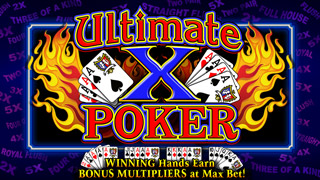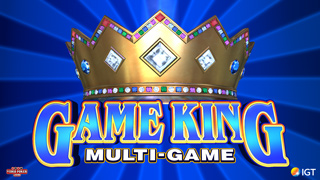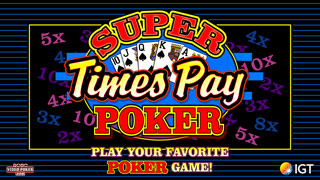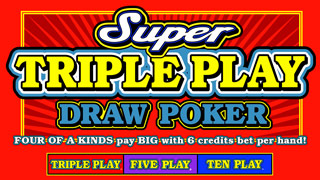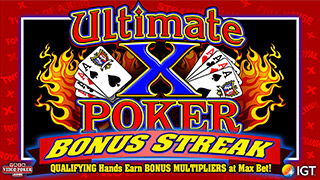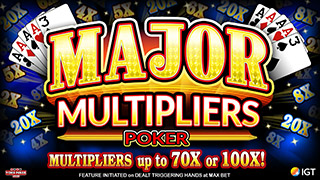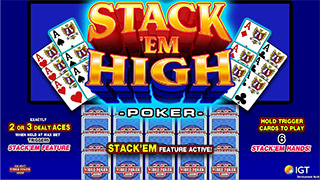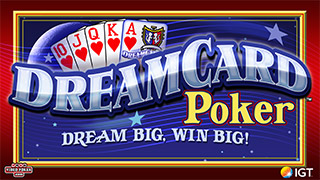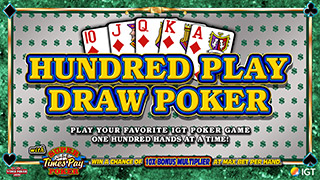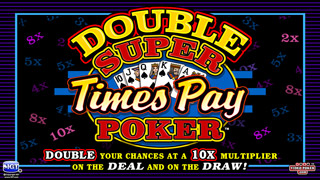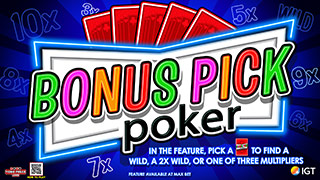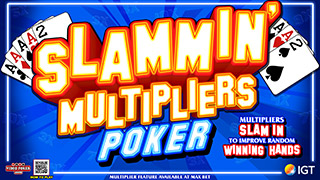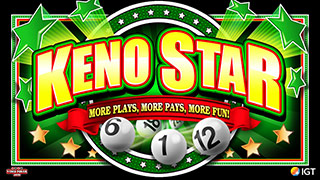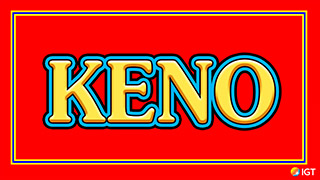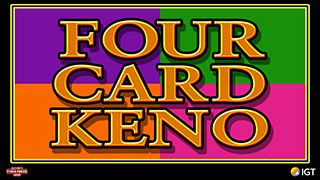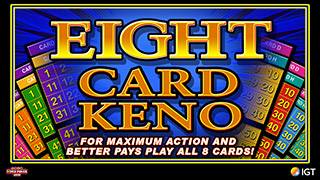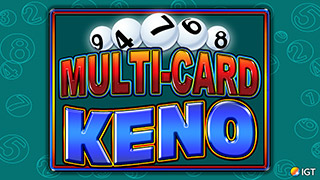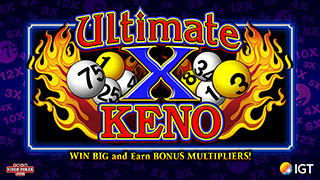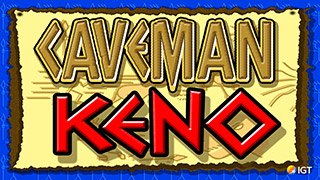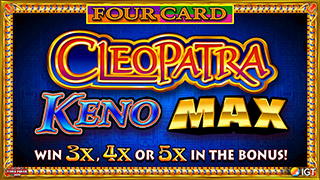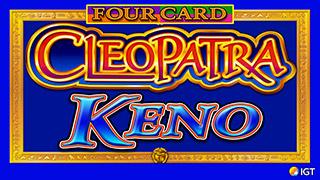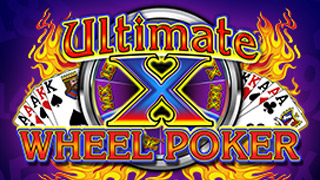RNGs & Randomness - Food for Thought
-
OTABILL
- Video Poker Master
- Posts: 3026
- Joined: Wed Dec 02, 2009 5:22 pm
RNGs & Randomness - Food for Thought
One of my dad's favorite expression was that there were lies. damnable lies and statistics. I bring this up because of the discussion of RNGs vis-a-vis video poker. I found an interesting article that discusses 2 types of RNGs, Pseudo-Random Number Generators (PRNGs) & True Random Number Generators (TRNGs). While TRNGs are described as most suitable for gambling, other articles say that PRNGs are used in slot machines. Presumably VP machines can use either. Furthermore according to the author of another article, there are 5 different types of randomness. Just wondering whether the fact that both RNGs and randomness can be defined in different ways allows inconsistencies in VP machine RNG software. Not sure if gaming regulations allow wiggle room regarding RNG type.
Three articles on this subject are:
Pseudo-Random Number Generators (PRNGs) & True Random Number Generators (TRNGs)
A classification scheme for types of randomness
Random Number Generators (RNGs) Are Not Truly Random! There's no such thing as a truly random slot game.
Three articles on this subject are:
Pseudo-Random Number Generators (PRNGs) & True Random Number Generators (TRNGs)
A classification scheme for types of randomness
Random Number Generators (RNGs) Are Not Truly Random! There's no such thing as a truly random slot game.
-
OTABILL
- Video Poker Master
- Posts: 3026
- Joined: Wed Dec 02, 2009 5:22 pm
I should have added another article relating to producing a weighted random number generator. adds another dimension especially if allowed under gaming authority rules relating to randomness. See:
Generate pseudo-random numbers
Within this articles is the following, "A common task is to make a random choice with weighted probabilities."
Generate pseudo-random numbers
Within this articles is the following, "A common task is to make a random choice with weighted probabilities."
-
Minn. Fatz
- VP Veteran
- Posts: 525
- Joined: Mon May 07, 2007 12:22 am
from your "no such thing' link:
[quote]For example, assume you are playing a video slot that requires three bonus symbols to land anywhere on the screen to trigger a bonus. Watch for the bonus symbols showing up on their own, and in pairs, all over the reels. Once you start seeing this happen across several spins, consider the slot machine to be "hot" and "on a streak." For some reason the slot machine's RNG is drawing bonus symbols frequently. This is a good thing! If the RNG is drawing the bonus symbols repeatedly on most, or all, of the reels, then a bonus may be awarded soon. If the bonus symbols are not showing up then it may be a while until the bonus occurs.[/quote]
Uh, no, that's the Gambler's Fallacy. The piece describes a coin flip experiment. Say you flip a fair coin 100 times and 100 times it turns up heads (unlikely, but possible). What is the probability that the 101st flip will be tails?
[quote]For example, assume you are playing a video slot that requires three bonus symbols to land anywhere on the screen to trigger a bonus. Watch for the bonus symbols showing up on their own, and in pairs, all over the reels. Once you start seeing this happen across several spins, consider the slot machine to be "hot" and "on a streak." For some reason the slot machine's RNG is drawing bonus symbols frequently. This is a good thing! If the RNG is drawing the bonus symbols repeatedly on most, or all, of the reels, then a bonus may be awarded soon. If the bonus symbols are not showing up then it may be a while until the bonus occurs.[/quote]
Uh, no, that's the Gambler's Fallacy. The piece describes a coin flip experiment. Say you flip a fair coin 100 times and 100 times it turns up heads (unlikely, but possible). What is the probability that the 101st flip will be tails?
-
olds442jetaway
- Video Poker Master
- Posts: 11476
- Joined: Tue Aug 21, 2007 9:08 pm
Funny, I got that term pseudo rngs from a long time slot tech at Mohegan Sun. I haven't read up everything on it yet with the attached links, but he said that is what they use there.
-
OTABILL
- Video Poker Master
- Posts: 3026
- Joined: Wed Dec 02, 2009 5:22 pm
from your "no such thing' link:
[quote]For example, assume you are playing a video slot that requires three bonus symbols to land anywhere on the screen to trigger a bonus. Watch for the bonus symbols showing up on their own, and in pairs, all over the reels. Once you start seeing this happen across several spins, consider the slot machine to be "hot" and "on a streak." For some reason the slot machine's RNG is drawing bonus symbols frequently. This is a good thing! If the RNG is drawing the bonus symbols repeatedly on most, or all, of the reels, then a bonus may be awarded soon. If the bonus symbols are not showing up then it may be a while until the bonus occurs.
Uh, no, that's the Gambler's Fallacy. The piece describes a coin flip experiment. Say you flip a fair coin 100 times and 100 times it turns up heads (unlikely, but possible). What is the probability that the 101st flip will be tails?[/QUOTE]
I posted that article mainly to demonstrate that VP Machines may use PRNGs. And as noted in my second comment, PRNGs can be weighted. I believe casinos do not engage in illegal activities. However, thought it would be interesting to discuss if there were ways legally to skewer RNGs (i.e. by weighting them). Flipping coins is irrelevant to this discussion as is most of that particular article.
[quote]For example, assume you are playing a video slot that requires three bonus symbols to land anywhere on the screen to trigger a bonus. Watch for the bonus symbols showing up on their own, and in pairs, all over the reels. Once you start seeing this happen across several spins, consider the slot machine to be "hot" and "on a streak." For some reason the slot machine's RNG is drawing bonus symbols frequently. This is a good thing! If the RNG is drawing the bonus symbols repeatedly on most, or all, of the reels, then a bonus may be awarded soon. If the bonus symbols are not showing up then it may be a while until the bonus occurs.
Uh, no, that's the Gambler's Fallacy. The piece describes a coin flip experiment. Say you flip a fair coin 100 times and 100 times it turns up heads (unlikely, but possible). What is the probability that the 101st flip will be tails?[/QUOTE]
I posted that article mainly to demonstrate that VP Machines may use PRNGs. And as noted in my second comment, PRNGs can be weighted. I believe casinos do not engage in illegal activities. However, thought it would be interesting to discuss if there were ways legally to skewer RNGs (i.e. by weighting them). Flipping coins is irrelevant to this discussion as is most of that particular article.
-
BillyJoe
- Video Poker Master
- Posts: 3198
- Joined: Sat Aug 23, 2008 2:00 pm
[QUOTE=Minn. Fatz] from your "no such thing' link:
[quote]For example, assume you are playing a video slot that requires three bonus symbols to land anywhere on the screen to trigger a bonus. Watch for the bonus symbols showing up on their own, and in pairs, all over the reels. Once you start seeing this happen across several spins, consider the slot machine to be "hot" and "on a streak." For some reason the slot machine's RNG is drawing bonus symbols frequently. This is a good thing! If the RNG is drawing the bonus symbols repeatedly on most, or all, of the reels, then a bonus may be awarded soon. If the bonus symbols are not showing up then it may be a while until the bonus occurs.
Uh, no, that's the Gambler's Fallacy. The piece describes a coin flip experiment. Say you flip a fair coin 100 times and 100 times it turns up heads (unlikely, but possible). What is the probability that the 101st flip will be tails?[/QUOTE]
I posted that article mainly to demonstrate that VP Machines may use PRNGs. And as noted in my second comment, PRNGs can be weighted. I believe casinos do not engage in illegal activities. However, thought it would be interesting to discuss if there were ways legally to skewer RNGs (i.e. by weighting them). Flipping coins is irrelevant to this discussion as is most of that particular article.
[/QUOTE]
Any skewing of results that would deviate from a randomly dealt 52-card deck would violate at least Nevada gaming regs.
[quote]For example, assume you are playing a video slot that requires three bonus symbols to land anywhere on the screen to trigger a bonus. Watch for the bonus symbols showing up on their own, and in pairs, all over the reels. Once you start seeing this happen across several spins, consider the slot machine to be "hot" and "on a streak." For some reason the slot machine's RNG is drawing bonus symbols frequently. This is a good thing! If the RNG is drawing the bonus symbols repeatedly on most, or all, of the reels, then a bonus may be awarded soon. If the bonus symbols are not showing up then it may be a while until the bonus occurs.
Uh, no, that's the Gambler's Fallacy. The piece describes a coin flip experiment. Say you flip a fair coin 100 times and 100 times it turns up heads (unlikely, but possible). What is the probability that the 101st flip will be tails?[/QUOTE]
I posted that article mainly to demonstrate that VP Machines may use PRNGs. And as noted in my second comment, PRNGs can be weighted. I believe casinos do not engage in illegal activities. However, thought it would be interesting to discuss if there were ways legally to skewer RNGs (i.e. by weighting them). Flipping coins is irrelevant to this discussion as is most of that particular article.
[/QUOTE]
Any skewing of results that would deviate from a randomly dealt 52-card deck would violate at least Nevada gaming regs.
-
Vman96
- Video Poker Master
- Posts: 3298
- Joined: Tue Jul 26, 2011 12:49 am
I should have added another article relating to producing a weighted random number generator. adds another dimension especially if allowed under gaming authority rules relating to randomness. See:
Generate pseudo-random numbers
Within this articles is the following, "A common task is to make a random choice with weighted probabilities."
As billyjoe said, at least for Nevada (but also several other states) weighting poker cards on the deal or the draw is illegal. It could easily be done if they wanted to break the law though.
Weighted probability choices are clearly in one my favorite games, STP. The multiplier is one in 15 times on average, but the weights for the STP multipliers when triggered are as follows:
2X - 17%
3X - 33%
4X - 16%
5X - 24%
8X - 6%
10X - 4%
Avg. multiplier awarded = 4.05X
Generate pseudo-random numbers
Within this articles is the following, "A common task is to make a random choice with weighted probabilities."
As billyjoe said, at least for Nevada (but also several other states) weighting poker cards on the deal or the draw is illegal. It could easily be done if they wanted to break the law though.
Weighted probability choices are clearly in one my favorite games, STP. The multiplier is one in 15 times on average, but the weights for the STP multipliers when triggered are as follows:
2X - 17%
3X - 33%
4X - 16%
5X - 24%
8X - 6%
10X - 4%
Avg. multiplier awarded = 4.05X
-
ko king
- VP Veteran
- Posts: 670
- Joined: Fri Feb 17, 2012 10:13 pm
[QUOTE=OTABILL] [QUOTE=Minn. Fatz] from your "no such thing' link:
[quote]For example, assume you are playing a video slot that requires three bonus symbols to land anywhere on the screen to trigger a bonus. Watch for the bonus symbols showing up on their own, and in pairs, all over the reels. Once you start seeing this happen across several spins, consider the slot machine to be "hot" and "on a streak." For some reason the slot machine's RNG is drawing bonus symbols frequently. This is a good thing! If the RNG is drawing the bonus symbols repeatedly on most, or all, of the reels, then a bonus may be awarded soon. If the bonus symbols are not showing up then it may be a while until the bonus occurs.
Uh, no, that's the Gambler's Fallacy. The piece describes a coin flip experiment. Say you flip a fair coin 100 times and 100 times it turns up heads (unlikely, but possible). What is the probability that the 101st flip will be tails?[/QUOTE]
I posted that article mainly to demonstrate that VP Machines may use PRNGs. And as noted in my second comment, PRNGs can be weighted. I believe casinos do not engage in illegal activities. However, thought it would be interesting to discuss if there were ways legally to skewer RNGs (i.e. by weighting them). Flipping coins is irrelevant to this discussion as is most of that particular article.
[/QUOTE]
Any skewing of results that would deviate from a randomly dealt 52-card deck would violate at least Nevada gaming regs. [/QUOTE]
I don't think for one second that a casino would alter or tamper with the RNG program once it has been approved and installed. I wouldn't doubt there have been a few meetings between casino executives, manufacturers and program suppliers to discuss different ideas as to how profits could be ramped up a bit and still remain in good graces with the regulators. As for the regulators, I've spent quite a bit of time chatting with some of these folks and they don't know squat about the games. I recall a conversation I had with one and I ask if these vp games were completely random, her answer was "I'm not sure but that's probably something I should know". Another one that I got to know fairly well was hired by the casino and I just about guess you could probably figure out what she was hired to do. Last but not least was very nice fellow I enjoyed talking to when I visited the casino, his previous job was a used car salesman. I can't speak for Nevada but I don't put much faith in the folks around these parts who are there to insure the integrity of the game.
[quote]For example, assume you are playing a video slot that requires three bonus symbols to land anywhere on the screen to trigger a bonus. Watch for the bonus symbols showing up on their own, and in pairs, all over the reels. Once you start seeing this happen across several spins, consider the slot machine to be "hot" and "on a streak." For some reason the slot machine's RNG is drawing bonus symbols frequently. This is a good thing! If the RNG is drawing the bonus symbols repeatedly on most, or all, of the reels, then a bonus may be awarded soon. If the bonus symbols are not showing up then it may be a while until the bonus occurs.
Uh, no, that's the Gambler's Fallacy. The piece describes a coin flip experiment. Say you flip a fair coin 100 times and 100 times it turns up heads (unlikely, but possible). What is the probability that the 101st flip will be tails?[/QUOTE]
I posted that article mainly to demonstrate that VP Machines may use PRNGs. And as noted in my second comment, PRNGs can be weighted. I believe casinos do not engage in illegal activities. However, thought it would be interesting to discuss if there were ways legally to skewer RNGs (i.e. by weighting them). Flipping coins is irrelevant to this discussion as is most of that particular article.
[/QUOTE]
Any skewing of results that would deviate from a randomly dealt 52-card deck would violate at least Nevada gaming regs. [/QUOTE]
I don't think for one second that a casino would alter or tamper with the RNG program once it has been approved and installed. I wouldn't doubt there have been a few meetings between casino executives, manufacturers and program suppliers to discuss different ideas as to how profits could be ramped up a bit and still remain in good graces with the regulators. As for the regulators, I've spent quite a bit of time chatting with some of these folks and they don't know squat about the games. I recall a conversation I had with one and I ask if these vp games were completely random, her answer was "I'm not sure but that's probably something I should know". Another one that I got to know fairly well was hired by the casino and I just about guess you could probably figure out what she was hired to do. Last but not least was very nice fellow I enjoyed talking to when I visited the casino, his previous job was a used car salesman. I can't speak for Nevada but I don't put much faith in the folks around these parts who are there to insure the integrity of the game.
-
Minn. Fatz
- VP Veteran
- Posts: 525
- Joined: Mon May 07, 2007 12:22 am
Flipping coins is irrelevant to this discussion as is most of that particular article.
Here's how the article read before the bit I quoted originally:
[quote]Find a coin and start flipping it (this is the easiest way to demonstrate a RNG). Write down each result as "Heads" or "Tails" until you get to around 20 flips. Do you see any patterns? Were there several "Heads" in a row? How often did your flips switch between "Heads" and "Tails?"[/quote]
It went on to compare flipping a coin to playing a slot machine, which if we're speaking of fair coins and RNGs, pseudo or not, is indeed the same thing.
Which means that the probability of getting heads on a fair coin flip after it has come up 20 heads in a row is exactly the same as any other time, 1/2. Which means that the probability of getting a bonus or any other outcome on a slot or VP machine, whether with an RNG or PRNG, is exactly the same on every new trial.
A PRNG uses a deterministic procedure to generate a series of numbers that are statistically identical to a random series of numbers. The kind of testing that theoretically is done by any state's or tribe's gaming enforcement people, and is most probably done in Nevada, would be able to find any "glitch" in the random number generation very easily.
My argument in favor of the fairness of random number generation is that since manufacturers have to make sure their machines pass muster in Nevada, and since any enforcement official's career would be made if they uncovered a hint of a problem with RNGs or PRNGs, it's not worth it, for the manufacturers or the casinos, to jigger the inner workings of the machines. With most pay tables the way they are, it's also not necessary.
Here's how the article read before the bit I quoted originally:
[quote]Find a coin and start flipping it (this is the easiest way to demonstrate a RNG). Write down each result as "Heads" or "Tails" until you get to around 20 flips. Do you see any patterns? Were there several "Heads" in a row? How often did your flips switch between "Heads" and "Tails?"[/quote]
It went on to compare flipping a coin to playing a slot machine, which if we're speaking of fair coins and RNGs, pseudo or not, is indeed the same thing.
Which means that the probability of getting heads on a fair coin flip after it has come up 20 heads in a row is exactly the same as any other time, 1/2. Which means that the probability of getting a bonus or any other outcome on a slot or VP machine, whether with an RNG or PRNG, is exactly the same on every new trial.
A PRNG uses a deterministic procedure to generate a series of numbers that are statistically identical to a random series of numbers. The kind of testing that theoretically is done by any state's or tribe's gaming enforcement people, and is most probably done in Nevada, would be able to find any "glitch" in the random number generation very easily.
My argument in favor of the fairness of random number generation is that since manufacturers have to make sure their machines pass muster in Nevada, and since any enforcement official's career would be made if they uncovered a hint of a problem with RNGs or PRNGs, it's not worth it, for the manufacturers or the casinos, to jigger the inner workings of the machines. With most pay tables the way they are, it's also not necessary.
-
OTABILL
- Video Poker Master
- Posts: 3026
- Joined: Wed Dec 02, 2009 5:22 pm
I regret posting that article because the only relevant part to me was the confirmation that PRNGs were acceptable RNGs and were used.



